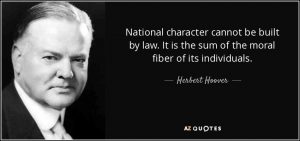Why study of National Character is important?
In a global economy, no nation is self-sufficient. Each is involved at different levels in trade to sell what it produces, to acquire what it lacks. The cultural distinctions that affect international business obviously go far beyond the product, price, place or promotion. Business organizations and nations are inter-dependent.
National character is an expression which describes forms of collective self-perception, sensibility, and conduct which are shared by the individuals who inhabit a nation/state. The term “national character” is used to describe the lasting nature, characteristics and unique life styles found among the populations of particular national states. This behavior is sometimes considered on an abstract level, that is, as cultural behavior without actual reference to necessarily different personality modalities. It may also be considered as motivated by underlying psychological mechanisms characteristic of a given people. National Character comprises of well-designed personality characteristics and patterns that are archetype among the adult members of a society. In other words, it is the sum total of the habits and attitudes, desires and inclinations, views and opinions, motives and standards, beliefs and ideas, and hopes and aspirations of an individual or a group which they share or interact with others in society.
National culture impacts how people interact with each other. In the business world, culture guides decision-making, behavior, thinking patterns and values. Each country has distinguishing national and regional cultural characteristics. The success of any prospective foreign business partnership centers on awareness of and respect for those distinctions. From a handshake, dressing standard, acceptable physical distance during conversation requires sensitivity to avoid misunderstandings. Attitudes differ on humor, punctuality and gestures can make a huge difference to business dealings in foreign countries.
Europe has had a long history of self-conscious awareness of national differences. In normal conversation and in articles we find thoughts of the differences between Danes and Swedes, between Belgians and Dutch, between Germans and Italians, or even between northern and southern Italians, northern and southern Belgians, or northern and southern Dutch. Every national group develops over a period of time based on certain stereotypes of members of other national entities. Commonly held stereotypes get developed for certain objectives, for certain detachments or with changing degrees of approval of the traits. While the perception of behavioral differences has led to a great deal of verbal expression and rough writing, only since the 1940. Serious efforts been made by anthropologist, psychologists and sociologists to explore systematically the validity or precise nature of the perceived differences with respect to underlying personality formations.
Japanese people believe more in socialism than individualism. They care about the national wellbeing. Therefore, they put more emphasis on harmony with others rather than having their own determined attitude. Japan is known for its culture of discipline and hard work. It is a testimony to the collective will and discipline of the Japanese people that despite being devastated in World War II, they quickly recovered and became one of the leading economies of the world and are, today, counted as one of the developed countries. They have a unified national character as people, language, culture, ethos, cuisines, are consistent across the country.
India is a land of diversity. It’s a diverse society, where people from different castes, colour, religion come together to give India a vibrant, dynamic and unique national character. The nation celebrates Diwali, EID and Christmas with equal zeal and vigor. Such diversity is hard to find anywhere else in the world and, therefore, differentiates us from the rest of the world.
In the formulation of implementation of foreign policy, a deep understanding of the character of a nation is one of the vital factors. Such understanding becomes part of almost every phase of foreign policy planning and execution. It helps in solving international problems in the areas of defense, diplomatic dealings, economic, political and trade.
Since a number of the national-character studies were conducted in a period of total war and were concerned with enemy or occupied countries, which were therefore inaccessible to direct research, substitute techniques had to be developed. Research of this kind came to be known as “the study of culture at a distance” (Mead & Métraux 1953). Nationals residing outside their countries were interviewed for reminiscences about child-rearing patterns and social attitudes influencing interpersonal relationships within their national states. In addition, since the societies studied were highly literate and employed mass means of communication, novels, cartoons, newspaper articles, and photographs were all available for systematic analysis. These materials were carefully examined for recurrent themes or other clues to customary attitudes and social perceptions that would point to possible underlying personality differences in the structure or hierarchy of values. The most important resource that is essential for nation building is not money, not big buildings but people. People form the backbone of any country and give it its distinct character.
Margaret Mead, Who is a strong advocate of national character studies has distinguished three approaches. First, there is the analysis of relationships between the basic learning common to children within a nation or culture and later characteristics witnessed in the behavior of adults within the same society. Adults shape up based upon their formative childhood experiences. Second, there are societal studies of the pattern and structure of interpersonal relationships. In any society, there are cultural sanctions operating continually which reinforce behavioral patterns, and thus there is an expected consistency in cultural formations. Third, based on studies comprising simple comparative descriptions of those cultural configurations national character gest distinguished.
A number of studies in national character are concerned with correlating the central role of culturally prevalent child-rearing practices with resultant personality modalities found in the adult. In these studies, variables such as weaning and toilet-training practices are seen as diagnostic of differential formative socialization experiences.
Another type of national-character study examines the basic personality traits that are necessary for at least a working minority of individuals within a society to keep that society functioning on its own terms. When Erich Fromm, the psychoanalyst, discussed national character (1941) he contended that in an industrial society with ever-increasing bureaucratization and standardization of occupations, the personality traits of discipline, orderliness, and punctuality are necessary. These traits have to be present in a significant portion of the population. Sociopolitical interpretations
One of the basic objectives of national-character studies is to examine the tensions underlying the political and social structures of modern states. Social tensions are particularly apparent in societies that are rapidly changing. For example, one type of social tension that is frequently observed results from the systematic attempts of an elite to establish particular patterns of directed social change, in spite of the unavailability of sufficient individuals whose training and social experience equip them for achieving the goals set by the elite. Some national-character studies seek to differentiate between the patterns that are characteristic of the elite and those patterns of the population that have been imposed upon it.
If necessary personality traits are not forthcoming from a proportionate number of individuals within the society, the society will not function well in terms of newer values, whatever the elite controlling the society attempts to do. Even though institutional legal structures are consciously changed in accord with social planning, if characteristic changes in socialization experiences do not accompany these changes in such a manner as to facilitate the appearance of adequate motivational behavior, the sought-after change will not become stabilized and self-perpetuating. With passing time, attitudes become rooted in a system of beliefs, traditions, taboos, habits, customs, and inhibitions constitute the distinctive culture of a state.

















































